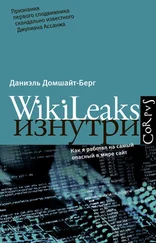Harding, Luke - WikiLeaks - Inside Julian Assange's War on Secrecy
Здесь есть возможность читать онлайн «Harding, Luke - WikiLeaks - Inside Julian Assange's War on Secrecy» весь текст электронной книги совершенно бесплатно (целиком полную версию без сокращений). В некоторых случаях можно слушать аудио, скачать через торрент в формате fb2 и присутствует краткое содержание. Жанр: Старинная литература, на английском языке. Описание произведения, (предисловие) а так же отзывы посетителей доступны на портале библиотеки ЛибКат.
- Название:WikiLeaks: Inside Julian Assange's War on Secrecy
- Автор:
- Жанр:
- Год:неизвестен
- ISBN:нет данных
- Рейтинг книги:3 / 5. Голосов: 1
-
Избранное:Добавить в избранное
- Отзывы:
-
Ваша оценка:
- 60
- 1
- 2
- 3
- 4
- 5
WikiLeaks: Inside Julian Assange's War on Secrecy: краткое содержание, описание и аннотация
Предлагаем к чтению аннотацию, описание, краткое содержание или предисловие (зависит от того, что написал сам автор книги «WikiLeaks: Inside Julian Assange's War on Secrecy»). Если вы не нашли необходимую информацию о книге — напишите в комментариях, мы постараемся отыскать её.
WikiLeaks: Inside Julian Assange's War on Secrecy — читать онлайн бесплатно полную книгу (весь текст) целиком
Ниже представлен текст книги, разбитый по страницам. Система сохранения места последней прочитанной страницы, позволяет с удобством читать онлайн бесплатно книгу «WikiLeaks: Inside Julian Assange's War on Secrecy», без необходимости каждый раз заново искать на чём Вы остановились. Поставьте закладку, и сможете в любой момент перейти на страницу, на которой закончили чтение.
Интервал:
Закладка:
18. (S/NF) Day expressed support for the development of a “cold war”-like relationship between India and Pakistan that would “introduce a degree of certainty” between the two countries in their dealings. He noted that recent intelligence indicates that Pakistan “is not going in a good direction.” Pakistan sees the debate about Afghanistan in the U.S. and the UK as demonstrating that the allies lack the will to maintain their commitment there. The Pakistanis also believe that their recent successes against extremists in the Swat valley validate their belief that they can deal with their own internal problems without changing their approach toward India. Day asked if the U.S. would be “obliged” to cut relations with Pakistan if the military took over again; he said that the last time the military assumed power the UK had maintained military-to-military ties. Day also asked for the U.S. perspective on Nawaz Sharif, whom he described as “potentially less venal” than other Pakistani leaders.
SUSMAN
DAVID MILIBAND PROVIDED ‘RARE
MOMENTS OF STAR POWER’ FOR
PARTY MISSING BLAIR
Monday, 03 March 2008, 17:06
CONFIDENTIAL LONDON 000639
SIPDIS
SIPDIS
NOFORN
Classified By: Ambassador Robert Tuttle, reasons 1.4 b, d
1. (C/NF) Summary: The Labour Party Spring Conference, held February 27 - March 2 in Birmingham, was characterized by low energy, poor attendance, and a lack of charismatic leadership, despite serving as a kick-off to the party’s campaign for the May 1 local elections in England and Wales. In his March 2 key note speech, Prime Minister Brown emphasized the need to prepare for the economy of the future and counted the opportunity costs for Britain of poverty, substandard education, and poor health care vowing that his “purposeful and progressive” government would continue to battle those scourges. Brown’s vision excited no opposition, but it excited no enthusiasm either at a pre-campaign conference that suffered from low attendance and, seemingly, straitened finances. Aimed primarily at Labour’s local level activists, the conference focused on recruiting female candidates, improving communications with minority communities, and enhancing Labour’s performance in local government. Media reporting focused on the irony that Secretary for Communities and Local Government Hazel Blears lauded Mayor Ken Livingstone for “revitalizing London” ahead of the hotly-contested May 1 mayoral race, without recalling that only eight years ago Labour expelled Livingstone from the party for insisting on running as an independent. Foreign Secretary David Miliband provided rare moments of star power for a party that seems increasingly to miss Tony Blair’s charisma. End Summary.
Brown: “Use the Opportunity of Power”
2. (C/NF) Labour’s Spring Conference February 27-March 2 in Birmingham, billed as the launching event for the May 1 local elections, featured a keynote speech by Prime Minister Gordon Brown intended to fire up the Labour faithful. In the event, Brown’s speech, eloquent as it was in articulating his vision of the party’s purpose, failed to move the audience beyond more than polite applause. Opening with an admission that the last few months had been difficult, Brown talked about the series of challenges his government had faced as soon as it came into office: floods, foot and mouth disease, avian flu, and the global credit crunch. He made no mention of the decision not to go to early elections that precipitated Labour’s plummeting poll numbers (see ref). Instead, Brown talked about the global economy of the future, in which skilled workers and entrepreneurs would reap high-value returns, and declared that higher standards of education would equip Britons to succeed in globalized future economy. He emphasized his view that poverty, particularly among children, was a “scar on Britain,” and he graphically listed the ways in which the denial of potential through inadequate health and education costs Britain talent and achievement. A Labour government that was “purposeful and progressive” (Brown slipped and said “powerful and progressive” but corrected himself) had to use the “opportunity of power” to bring the “power of opportunity” to those elements of British society in need.
3. (SBU) While Brown’s speech focused largely on domestic issues, he did extend his analysis to the costs of poverty to the rest of the world, noting that 72 million children have no access to schools, and vowing to eliminate diseases such as diphtheria, tuberculosis, and malaria. Brown called for an extension of sanctions on Sudan and for the release of Burmese dissident Aung San Suu Kyi.
4. (SBU) In a Q&A session that followed Brown’s remarks, many of the questions from the audience had to do with the Labour government’s management of school standards and health care - the bread and butter issues for Labour members at the local level. (Embassy comment: Discussion of educational issues became rather detailed: one Birmingham MP told Poloff that the “Labour Party is made up of teachers,” explaining that their parochial concerns tend to dominate party events. End comment.) Curiously, given media reports of an imminent possible rebellion against the government on pending security legislation to extend the legal detention period from 28 to 42 days, the subjects of terrorism, police powers, and civil liberties were not raised. And while Brown pounded the Conservative Party on its plans for tax cuts and opposition to the Lisbon Treaty’s plan for EU reform, he made little reference to the upcoming battles for local councils in which the Liberal Democrat Party poses as large a threat to Labour as do the Tories. A member of “Labour Students” from Cardiff rose to say she had been eight years old when Labour came to power, and asked what should she tell people now about what makes Labour a radical force? Brown reiterated his calls for ending poverty and eliminating disease globally. A Palestinian asking what Brown would do to end the conflict in Palestine provoked a rare outburst of applause; Brown responded by noting a planned upcoming investment conference.
Labour’s Financial Woes
5. (C/NF) The lack of energy that hung like a pall over the keynote speech was evident elsewhere, either because of low attendance or the party’s financial woes. Labour members groused that conference organizers had chosen a bad weekend – Welsh members stayed away to attend the March 1 St. David’s Day festivities back home (St. David is the patron saint of Wales and his feast day is a Welsh nationalist obligation). And the March 2 observance of Mother’s Day in Britain put many prospective attendees in the position of choosing between the Labour Party and their “mums.” Judging by the turnout, Mum won in many cases. Labour Party workers, who have been living on a shoestring for the past several years, were scarce on the ground. Those who were present were not particularly motivated: asked for a copy of the Prime Minister’s speech, one party worker referred Poloff to the website version which, several hours later, had not yet been updated to reflect extensive changes in delivery. Some Labour members, noting the party’s financial straits, asked why so much money had been spent on the Labour deputy leader race in 2007, noting that the money raised by the candidates would have been better spent to support the party’s local campaigns this year.
Female Recruitment
6. (C) Organized around three key themes, the Conference focused on recruiting female candidates, improving communications with minority communities, and enhancing Labour’s performance on local government. The three areas were selected with a view to preparing for local elections but there seemed to be a disconnect between the state of those efforts and the imminence of the May elections. Regarding women’s empowerment, MP Barbara Follett provided advice on presenting oneself effectively as a woman candidate to an audience of about 25 women that included only one prospective, not active, candidate. (Embassy comment: While Labour rightly congratulates itself on having more female MPs that the Tories, the recruitment/empowerment process at the conference appeared to be still in its early stages. End comment.) Local Labour organizations and the trades unions, according to other speakers on women’s issues, are where women have to rise through the ranks without much help from the central party apparatus.
Читать дальшеИнтервал:
Закладка:
Похожие книги на «WikiLeaks: Inside Julian Assange's War on Secrecy»
Представляем Вашему вниманию похожие книги на «WikiLeaks: Inside Julian Assange's War on Secrecy» списком для выбора. Мы отобрали схожую по названию и смыслу литературу в надежде предоставить читателям больше вариантов отыскать новые, интересные, ещё непрочитанные произведения.
Обсуждение, отзывы о книге «WikiLeaks: Inside Julian Assange's War on Secrecy» и просто собственные мнения читателей. Оставьте ваши комментарии, напишите, что Вы думаете о произведении, его смысле или главных героях. Укажите что конкретно понравилось, а что нет, и почему Вы так считаете.












